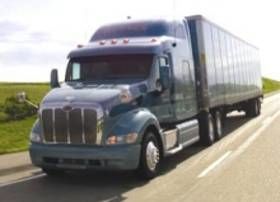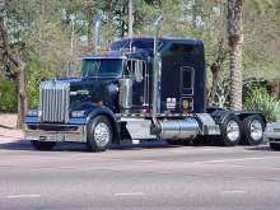Tanker Or Dry Van?
Topic 16246 | Page 1

There are exceptions, but generally speaking it's advisable for a new driver to get a year or so before driving tankers, especially food grade. The surge that occurs during braking and cornering is a challenge to be dealt with, above and beyond the normal learning curve a rookie experiences.
Renegade, we've had this discussion many times in here, and I'm sure you could use our search bar at the top of the page to find all kinds of discussions. Here's one that just recently resurfaced in here that might help you a little.
I think you'll find that tanker jobs may pay a little more per mile, but perhaps not have as much opportunity to turn big miles due to wash-out times and or unloading time frames at refineries, etc. Most of the time if you are a good hardworking driver who has taken the time to learn the ropes and do your job well you will make some decent money no matter where you are working. Don't let yourself get all distracted with which type of job pays the most per mile, it is a misleading number that doesn't really mean anything in the end. Your productivity is what will net you the most money in this business, and dry van usually will have the most drop and hook type scenarios which allows you more time to roll out the miles.
Have you seen our Truck Driver's Career Guide? You should check it out, I think you will gain a lot of insight just by going through the pages in there.
Dry Van:
A trailer or truck that that requires no special attention, such as refrigeration, that hauls regular palletted, boxed, or floor-loaded freight. The most common type of trailer in trucking.Reefer:
A refrigerated trailer.
Drop And Hook:
Drop and hook means the driver will drop one trailer and hook to another one.
In order to speed up the pickup and delivery process a driver may be instructed to drop their empty trailer and hook to one that is already loaded, or drop their loaded trailer and hook to one that is already empty. That way the driver will not have to wait for a trailer to be loaded or unloaded.
Thats my target too. Get OTR experience for 1 or 2 years then go for tanker. As of now I am loving OTR and when I get tired I will jump to tank division.
OTR:
Over The Road
OTR driving normally means you'll be hauling freight to various customers throughout your company's hauling region. It often entails being gone from home for two to three weeks at a time.
I drive dry van and have considered tanker a few times. Yes working hard is important in any position. However, working physically harder doesn't necessarily translate into more money, as Old School points out.
I've stayed with dry Van for a number of reasons; none the least of which is I tore up my body pretty well in a previous life. Also, I've been told by experienced tanker drivers, that based on miles I drive and current rate of pay, I'd likely not see a net pay increase just by switching to tanker.
So, I say choose the type of driving job you want first, then look for pay and other benefits.
I hope this is helpful.
Dry Van:
A trailer or truck that that requires no special attention, such as refrigeration, that hauls regular palletted, boxed, or floor-loaded freight. The most common type of trailer in trucking.OOS:
When a violation by either a driver or company is confirmed, an out-of-service order removes either the driver or the vehicle from the roadway until the violation is corrected.

Great info guys.....thanks for the encouragement as well.

I think it's easy to work on a tanker, i have tried it and i can't say that it's more difficult than using a dry van
Dry Van:
A trailer or truck that that requires no special attention, such as refrigeration, that hauls regular palletted, boxed, or floor-loaded freight. The most common type of trailer in trucking.
Thentair wrote:
I think it's easy to work on a tanker, i have tried it and i can't say that it's more difficult than using a dry van
Could you specify the "why" supporting your reply? Why do you think "working" with a tanker is easier than a dry van?
Dry Van:
A trailer or truck that that requires no special attention, such as refrigeration, that hauls regular palletted, boxed, or floor-loaded freight. The most common type of trailer in trucking.
Thentair wrote:
I think it's easy to work on a tanker, i have tried it and i can't say that it's more difficult than using a dry van
Could you specify the "why" supporting your reply? Why do you think "working" with a tanker is easier than a dry van?
Don't think he said it was "easier" - just that it wasn't "more difficult" - which to me means, about equal to.
The things you elaborated earlier make the actual DRIVING of a tanker more difficult. As well as the stuff OS discussed regarding washouts, and the fact that loads/unloads are typically ALWAYS LIVE LOADS - mean less drive time (miles) and more time doing "other on-duty stuff" (usually not compensated).
Then again - some folks love Flatbed (with securement, tarping, etc. - in all types of weather) and that's typically the highest paying segment of this industry. With the most physically intense work, and the highest risk/incident of injury.
Rick
Dry Van:
A trailer or truck that that requires no special attention, such as refrigeration, that hauls regular palletted, boxed, or floor-loaded freight. The most common type of trailer in trucking.
Thentair wrote:
I think it's easy to work on a tanker, i have tried it and i can't say that it's more difficult than using a dry van
Could you specify the "why" supporting your reply? Why do you think "working" with a tanker is easier than a dry van?
Don't think he said it was "easier" - just that it wasn't "more difficult" - which to me means, about equal to.
The things you elaborated earlier make the actual DRIVING of a tanker more difficult. As well as the stuff OS discussed regarding washouts, and the fact that loads/unloads are typically ALWAYS LIVE LOADS - mean less drive time (miles) and more time doing "other on-duty stuff" (usually not compensated).
Then again - some folks love Flatbed (with securement, tarping, etc. - in all types of weather) and that's typically the highest paying segment of this industry. With the most physically intense work, and the highest risk/incident of injury.
Rick
Nox-Mix. Okay "as easy"...
I'd still like him to elaborate on his answer, might be valuable for the OP and anyone else interested in tanker operation.
Dry Van:
A trailer or truck that that requires no special attention, such as refrigeration, that hauls regular palletted, boxed, or floor-loaded freight. The most common type of trailer in trucking.New Reply:
New! Check out our help videos for a better understanding of our forum features

















Preview:








 TT On Facebook
TT On Facebook
Recently I've had people tell me that I should choose tanker over dry van , and then I've had people tell me I should choose dry van over tanker. The biggest argument has been "you'll make great money in the tanker division but you work too hard". Isn't that how you make great money in every field of work by having a great attitude and working hard?
Dry Van:
A trailer or truck that that requires no special attention, such as refrigeration, that hauls regular palletted, boxed, or floor-loaded freight. The most common type of trailer in trucking.OOS:
When a violation by either a driver or company is confirmed, an out-of-service order removes either the driver or the vehicle from the roadway until the violation is corrected.